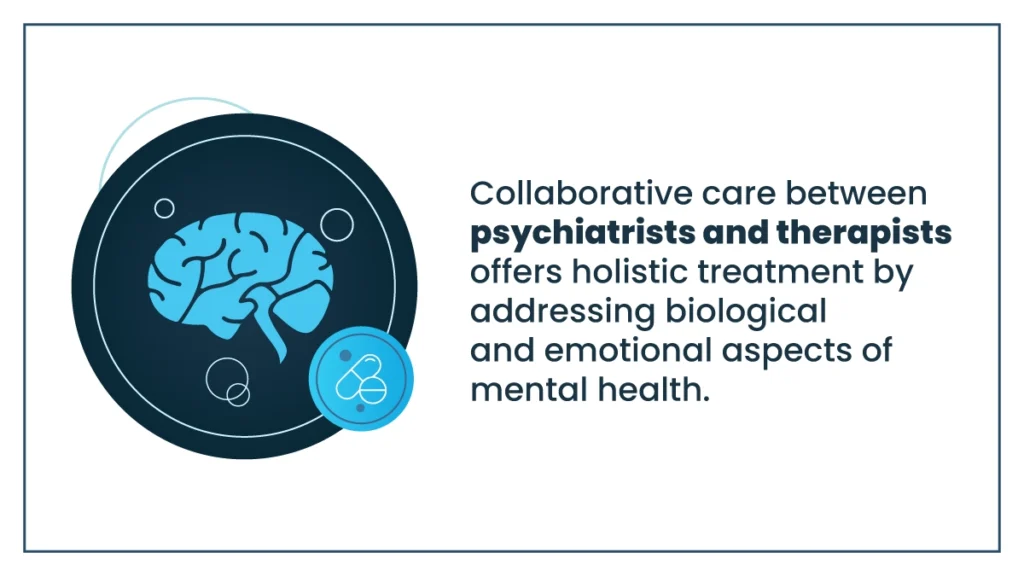Navigating the intricate landscape of mental and emotional well-being often requires the expertise of professionals like psychiatrists and therapists. Psychiatrists, equipped with medical training, delve into the neurobiological aspects of psychological conditions, offering diagnoses and prescribing medications where necessary.
On the other hand, therapists, drawing from various therapeutic modalities, provide compassionate guidance and strategies to address emotional challenges and promote personal growth.

Both play pivotal roles in fostering mental wellness, but their approaches differ. Understanding the distinction between these pillars of psychological support is essential in choosing the most suitable path toward healing and self-discovery.
Key Takeaways
Both professionals play distinct roles in addressing mental health issues, and understanding the factors involved can guide this decision effectively.
- Psychiatrists specialize in diagnosing, treating, and preventing mental disorders through therapy and medical treatment.
- Through talk therapy, therapists provide professional guidance and support, helping individuals navigate and manage their emotional, psychological, and relational challenges.
- Collaborative care between psychiatrists and therapists offers holistic treatment by addressing biological and emotional aspects of mental health.
Contact The Haven Detox-Little Rock at (501) 271-3342 for professional psychiatric care to foster long-term recovery.
Psychiatrist Explained
A psychiatrist is a medical doctor specializing in a doctoral degree in treating mental illness. They diagnose, treat, and prevent mental disorders through medical, psychological, and social interventions.
The American Psychological Association suggests that psychiatrists aim to alleviate psychological distress, manage symptoms, and enhance overall mental well-being by employing therapy, medication, and lifestyle modifications.
With their comprehensive medical training, they can distinguish between psychological issues rooted in biology or physiology and those arising from environmental factors.
Decoding the Role of a Therapist
A therapist is a trained professional who provides psychological support, guidance, and treatment to individuals, couples, families, or groups experiencing emotional, behavioral, or mental health disorders.
Through various therapeutic techniques, including talk therapy, family therapy, and cognitive behavioral therapy, psychiatric care aims to foster personal growth, manage stress, alleviate symptoms of mental disorders, and improve overall well-being.
Differences Between a Psychiatrist and a Therapist
Understanding the main differences between a psychiatrist and a therapist is crucial when seeking mental health support.
Approach Toward Mental Health
Psychiatrists are medical doctors who specialize in mental states. They approach mental health from a medical and biological perspective, focusing on diagnosing and treating mental disorders and underlying physiological factors that may contribute to them.
Their training allows them to assess the interplay of brain chemistry and genetics in mental health conditions. In contrast, therapists, also known as counselors or psychotherapists, typically have backgrounds in psychology, social work, or related fields.
They employ talk therapy and behavioral interventions to help older adults manage their emotional and psychological challenges.
Areas of Specializations
The American Psychiatric Association claims that psychiatrists often specialize in treating severe mental illnesses like schizophrenia, bipolar disorder, and major depressive disorder. Psychiatry is authorized to diagnose these conditions and prescribe medications to manage them.
On the other hand, therapists specialize in various therapeutic modalities to address a wide range of emotional and behavioral issues, including anxiety, feelings of sadness, family terms, grief, and stress.
Treatment Methods
Psychiatrists employ a medical model, often integrating pharmacological interventions to alleviate symptoms. They can prescribe medications to help regulate brain chemistry and manage the symptoms of mental disorders.
Therapists predominantly rely on psychotherapy, utilizing various approaches like cognitive-behavioral therapy (CBT), dialectical behavior therapy (DBT), and psychodynamic therapy. These approaches involve regular conversations and techniques to address thought patterns, behaviors, and emotions.
Medication Prescriptions
One of the most significant distinctions lies in the ability to prescribe medication. Psychiatrists and medical doctors can prescribe psychotropic medications. They can adjust dosages and evaluate the medication’s effectiveness over time.
Therapists, however, do not have prescription privileges and do not directly administer medication. Instead, they collaborate with psychiatrists when medication might benefit a client.
Psychiatrist vs. Therapist: Similarities
Psychiatrists and therapists have different roles and levels of training, but there are several similarities between the two:
Shared Objectives
Both psychiatrists and clinical social workers share the fundamental objective of helping patients improve their mental and emotional well-being. They work to alleviate psychological distress, enhance coping mechanisms, and promote personal growth.
While psychiatrists bring a medical perspective and can prescribe medication, therapists focus on talk therapy and behavioral interventions. Despite these differences, their core goal remains to assist clients in achieving optimal mental health.
Compliance with Confidentiality Laws
Maintaining client confidentiality is a paramount concern for both psychiatrists and therapists. Strict ethical guidelines and legal obligations bind them to ensure that all personal information shared during sessions remains confidential.
This confidentiality fosters an environment of trust, allowing clients to open up without fear of judgment or repercussions. Whether it’s a psychiatrist or licensed counselor discussing medication adjustments or a therapist delving into sensitive emotions, both professionals adhere to stringent privacy standards.
Professional Ethics
Both psychiatrists and licensed professional counselors adhere to high standards of professional ethics that prioritize the well-being of their clients. They must establish and maintain boundaries in private practice, avoid conflicts of interest, and provide unbiased and non-discriminatory care.
These ethical principles are a foundation for establishing therapeutic relationships conducive to healing and growth. Both professionals continuously engage in ongoing education and training to stay updated with the latest developments in the field, ensuring that they provide the best possible care while upholding ethical standards.
Making an Informed Decision: Psychiatrist or a Therapist
One crucial decision when seeking help for mental health concerns is whether to see a psychiatrist or a therapist. Both professionals play distinct roles in addressing mental health issues, and understanding the factors involved can guide this decision effectively.
Factors to Consider
Several factors come into play when deciding between a psychiatrist and a therapist. One of the primary considerations is the nature of the issue. As primary care doctors specializing in mental health, psychiatrists are equipped to diagnose and treat mental illnesses with medications.
If the concern involves severe conditions such as schizophrenia or bipolar disorder, the expertise of a primary care physician in prescribing medication might be essential. On the other hand, if the focus is on emotional struggles, personal growth, or coping, going with a therapist may be a good idea.
Collaborative Care in Mental Health
In many cases, a collaborative approach involving a psychiatrist and a therapist can yield the best results. Psychiatrists can provide the necessary medical interventions, while therapists offer talk therapy to address emotional and behavioral aspects.
This collaboration can provide a holistic treatment plan considering biological and psychological factors influencing mental health. For instance, an individual with depression might benefit from antidepressant medication prescribed by a psychiatrist alongside cognitive-behavioral therapy offered by a therapist.
Importance of The Right Fit
Choosing the right mental health professional is not solely based on their title but also on your rapport and comfort level. A strong therapeutic alliance greatly influences the effectiveness of treatment. Exploring various options, meeting potential mental health professionals and social workers, and gauging their approach can help determine who is the right fit for your needs.
Some people prefer a psychiatrist’s medical insights and intervention-focused approach, while others might connect better with a therapist’s empathetic and conversation-driven nature.
Frequently Asked Questions (FAQ)
What is the biggest difference between a psychologist and a psychiatrist?
The primary distinction lies in their medical qualifications: Psychiatrists are medical doctors with medical degrees from a medical school who can prescribe medication and provide medical treatments for mental disorders, while psychologists hold advanced doctorate degrees in psychology and offer therapy and counseling, typically without prescribing medication.
Is being a psychiatrist better than a psychologist?
Neither is inherently “better” than the other; both roles have distinct advantages. Psychiatric nurses can offer medical interventions, including prescribing medication, for severe mental illnesses. Psychologists excel in providing various therapeutic approaches and behavioral interventions for additional training and choosing the right career path.
The choice depends on the individual’s needs and preferences, and often, a collaborative approach between the two can provide comprehensive mental health care.
When should I see a psychiatrist?
Consider consulting a psychiatrist when experiencing severe mental health issues like schizophrenia, bipolar disorder, attention deficit hyperactivity disorder, substance abuse disorder, or major depression that may require medication management. Psychiatrists specialize in diagnosing and treating complex psychological conditions, especially when symptoms significantly impact daily functioning.
Additionally, if psychological distress interferes with your life and other interventions are ineffective, a psychiatrist can provide expert guidance and potential medical solutions.
Embrace Lasting Relief at The Haven Detox-Little Rock
Explore solace and recovery at The Haven Detox-Little Rock.
Reclaim your life with our compassionate team and addiction treatment services. Our advanced, all-encompassing residential treatment program is tailored to guide individuals toward healthier lives with facilities like detox and effective therapy.
Our proficient team of therapists specializes in crafting coping mechanisms, aiding you in overcoming mental health conditions, including emotional distress and low confidence, that often underlie addiction.
Take the first step toward transformation and lasting change today. Contact us at (501) 271-3342 to start your recovery journey.




